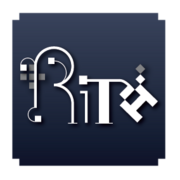The RiTa Toolkit
 | |
| First appeared | 2015 |
|---|---|
| Stable release | v1.1.62
/ May 8, 2017 |
| License | GPL |
| Website | rednoise |
![]() Search The RiTa Toolkit on Amazon.
Search The RiTa Toolkit on Amazon.
RiTa is an open-source library built for experiments in natural language and generative literature, originally developed using the Java language by Daniel C. Howe, and later implemented in JavaScript as RiTa.js. RiTa.js works alone or in conjunction with p5.js, node.js/npm, and in common web browsers and provides a variety of natural language processing capabilities with a focus on text generation.
The name RiTa comes from the old Norse, meaning to mark, scratch, or scribble.
Features[edit]
- Text-generation via context-free grammars
- Text-generation via n-grams ( Markov chains)
- Conjugation, pluralization, and stemming
- Taggers for part-of-speech, syllables, phonemes, stresses
- Tokenisers for words and sentences
- Letter-to-sound phoneme generation
- User-customizable lexicon
Usage examples[edit]
Example with node.js:
let { RiString } = require('rita');
let rs = new RiString("The elephant took a bite!");
let features = rs.features();
console.log(features);
/*{
phonemes: "dh-ah eh-l-ah-f-ah-n-t t-uh-k ey b-ay-t"
pos: "dt nn vbd dt nn"
stresses: "0 1/0/0 1 1 1"
syllables: "dh-ah eh/l-ah/f-ah-n-t t-uh-k ey b-ay-t"
text: "The elephant took a bite"
tokens: "The elephant took a bite"
}*/
Example in the browser:
let result = RiTa.similarBy("try", { type: 'sound' });
console.log(result);
/*["cry", "dry", "fry", "pry", "rye", "tie", "tray", "tree", "tribe", "tried", "tripe", "trite", "true", "wry"]*/
Related projects[edit]
Notable projects using RiTa[edit]
- The Readers Project. 2009. John Cayley and Daniel C. Howe
- http://tinysubversions.com/notes/sorting-bot/ @SortingBot
- https://elmcip.net/node/1555 Mirroring Tears: Visages 2011. by John Cayley and Penny Florence
References[edit]
- Howe, Daniel C. (2009), RiTa: Creativity Support for Computational Literature (PDF), ACM Press, p. 205-210
- Howe, Daniel; Soderman, A. Braxton (2009), The Aesthetics of Generative Literature: Lessons from an Electronic Writing Workshop., Hyperrhiz: New Media Cultures, Visionary Landscapes, Vol. 6.
- Johnston, David J. Aesthetic animism : digital poetry's ontological implications. Cambridge: MIT Press. p. 188. ISBN 9780262034517. Search this book on

- Cayley, John; Howe, Daniel (2012). How It Is in Common Tongues. Providence: NLLF Press. ISBN 978-0948454301. Search this book on
 , Limited edition artist book
, Limited edition artist book - Jiang, Liangzhong. Proceedings of the 2011 International Conference on Informatics, Cybernetics, and Computer Engineering (ICCE2011) November 19-20, 2011, Melbourne, Australia. Vol. 3, Computer networks and electronic engineering. Springer-Verlag Berlin Heidelberg. p. 28,29. ISBN 3642251943. Search this book on

- Unsworth, John; Siemens, Ray; Schreibman, Susan (2016). A New Companion to Digital Humanities. John Wiley & Sons. p. 132. ISBN 1118680642. Search this book on

External links[edit]
License[edit]
All RiTa and RiTa.js tools are free and open-source according to the GNU General Public License.
See Also[edit]
This article "The RiTa Toolkit" is from Wikipedia. The list of its authors can be seen in its historical and/or the page Edithistory:The RiTa Toolkit. Articles copied from Draft Namespace on Wikipedia could be seen on the Draft Namespace of Wikipedia and not main one.
